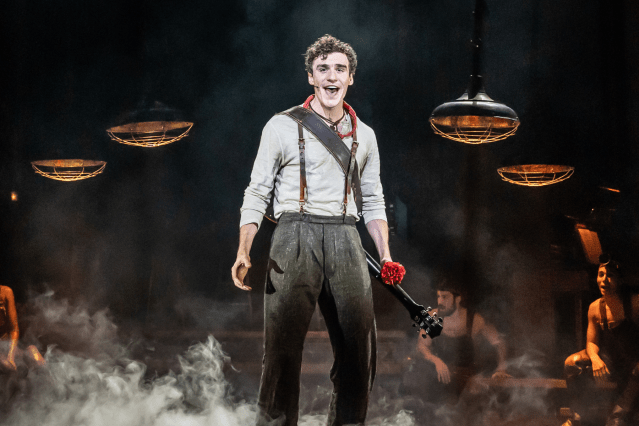Critics got their first view of the new so-called “Holocaust musical” Imagine This last night (19 November 2008, previews from 4 November) at the West End’s New London Theatre (See Today’s 1st Night Photos), returning to the venue where they so mercilessly assailed Trevor Nunn’s Gone With the Wind earlier in the year (See Review Round-Up, 23 Apr 2008).
First seen in a tryout last summer at the Theatre Royal Plymouth, Imagine This, which is currently booking until 28 February 2009, revolves around a group of Polish actors in the Warsaw Ghetto in 1942 who stage plays to inspire hope and optimism within the Jewish community. However, with rumours of the Final Solution in the air, their play merges with the reality they are trying to escape and a dramatic love story unfolds.
Imagine This has music by Shuki Levy, lyrics by David Goldsmith and a book by Glenn Berenbeim. It’s directed by Open Air artistic director Timothy Sheader and designed by Eugene Lee, who won both a Tony and a Whatsonstage.com Award for Wicked, with choreography by DV8’s Liam Steel. The principal West End cast features Leila Ben Harris, Simon Gleeson and Peter Polycarpou, who reprises his role from the Plymouth run (See News, 26 Aug 2008).
For most overnight critics, the attempt of Imagine This to find hope in the Holocaust was beyond the stretch of their collective imaginations. This morning’s reviews contained an almost universal theme – that despite director Timothy Sheader’s best efforts and some “valiant” performances from the cast, the show hit a dud note due to its “historically false” and “morally dubious” depiction of the Warsaw ghetto. There were some positives amid the gloom, notably the “stoic dignity” of Polycarpou and the “soaring anthems” of Levy and Goldsmith (even if their “trivial” lyrics came in for some heavy criticism). But overall it looks as if the New London is suffering a serious case of déjà vu.
Michael Coveney on Whatsonstage.com (one star) – “The major problem here is that once the situation of fierce resistance is established, there is nowhere for the characters to go except towards the exit. Timothy Sheader’s resourceful and often effective production attempts to create light and shade in deals with the Nazis, hints of betrayal and the shocking business of an informant bartering a fur cloak, sleeping with the enemy and being shot in the back for her pains … The music and lyrics of Shuki Levy and David Goldsmith, while neat enough in a mediocre way, never rise to the impassioned authenticity of their obvious example in Les Miserables. Polycarpou does his level best to hold the show together, and wins a round with his dark night of the soul (with Jewish jokes) number, ‘The Last Laugh’ … But this is to accentuate the positive in an engulfing sea of negative.”
Michael Billington in the Guardian (two stars) – “They said it couldn’t be done: a musical about the Warsaw ghetto. And, now that I’ve seen it, I know that they were right … In attempting to dovetail the stories, Glenn Berenbeim‘s book creates more problems than it solves. It not only depends on a grotesquely improbable love affair between Tamar, daughter of the Masada leader, and a Roman general. The basic premise also beggars belief – it is hard to credit the Nazis would sanction a show about Masada even though they are assured, ‘It’s got singing, dancing and all the Jews die in the end’. And the musical, far from the rough-and-ready spectacle you would expect with minimal resources, turns out to be a surprisingly well-equipped show up to West End standards … The best one can say is Timothy Sheader stages the grisly event with fluidity. Peter Polycarpou lends the actor-manager and Masada leader a certain stoic dignity, and Leila Benn Harris and Simon Gleeson do all they can as the unlikely love interest.”
Charles Spencer in the Daily Telegraph (three stars) – “At one level, the show strikes me as not bad at all. There are big soaring anthems, a strong love interest and a plot that undoubtedly grips. The production values, though far from extravagant, are effective enough, and though there are no star names, the performances are impressive … Imagine This has a certain integrity about it. Except, of course, for one inconvenient, incontrovertible and unpalatable fact – this is a musical that attempts to turn the Holocaust into entertainment. It resorts to fiction to make unimaginable horror more dramatically interesting … The moment when a comic Christian starts singing on his cross moves us alarmingly close to Life of Brian territory, and for all the strengths of its execution, Imagine This must finally be judged a manipulative and morally dubious show. In the present harsh economic climate, however, it is unlikely to trouble the West End for long.”
Benedict Nightingale in The Times (two stars) – “Imagine This? That’s the title of a show that involves Jewish actors performing an inspiring play in the Warsaw Ghetto; but it also comes across as a mix of command and plea. And, sorry, no can do. Last night Glenn Berenbeim’s book began by making me feel my imagination might take fire, only to douse it with the sort of formulaic nonsense it has resisted a zillion times before … I should have been warned by lines such as (to Daniel): ‘In a ghetto full of misery, only you can come down with a bad case of optimism.’ That clunkiness never goes and it’s accompanied by a major loss of nerve on everyone’s part … Shuki Levy’s score can handle the sad or upbeat, notably in a soaring title song that claims that only imagination can free the oppressed. But it never has the minor-key harshness the situation demands. And what of the number involving undulating belly dancers and prancing Roman soldiers? That’s something nobody should have imagined.”
Nicholas de Jongh in the Evening Standard (two stars) – “I am afraid a bad-taste warning needs to be attached to this unfortunate new musical. The talented director Timothy Sheader and his team of ardent, forceful actors and dancers are not to blame. They struggle valiantly to rise above the offensively banal, soft-pop music that limps in train with the fatuities and ineptitude of David Goldsmith’s trivial lyrics … An attempt is made to raise audience morale, encouraging people to leave the theatre in a modestly feelgood state. Yet to strike these musical notes of defiance is historically false … It would have been more dramatic though if Imagine This had concentrated upon Warsaw and had removed the unconvincing plot-line that involves Peter Polycarpou’s authoritative Jewish leader in a campaign to convince his actors they should kill themselves rather than become Nazi stooges. In any case, the music and songs of Imagine This never do justice to its terrifying theme.”
– by Theo Bosanquet












